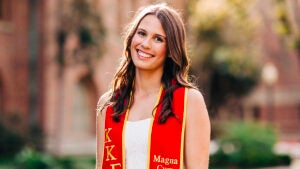USC Dornsife NEWS
2 Bridge Institute BUGS grads finish with Fulbright fellowships in hand
Students attribute Fulbright opportunities to study diabetes and cancer to research experience gained at the Bridge Institute at the USC Michelson Center for Convergent Bioscience.
Kylie Burdsall wanted to help patients with diabetes monitor when to take their medications to keep their blood sugar levels under control.
Dillon McKinley as a child often feared that he would develop cancer, and now he studies the disease.
Both students were undergraduate researchers through the Bridge Undergraduate Science Program (BUGS for short), run by the Bridge Institute at the USC Michelson Center for Convergent Bioscience. Throughout the program, they worked closely with faculty members at the Bridge Institute and the USC Dornsife College of Letters, Arts and Sciences to make a difference for patients.
And now both are graduating from USC, magna cum laude, and each with a Fulbright research fellowship that begins this fall.
Diabetes research
For Burdsall, the Fulbright fellowship has rewarded her for years of undergraduate work on diabetes research through the BUGS program and, more recently, working with USC Dornsife chemist Raymond Stevens, Provost Professor of Biological Sciences, Chemistry, Neurology, Physiology and Biophysics and Chemical Engineering and Materials Science and Bridge Institute director.
Burdsall added that her interest in studying diabetes has been driven by the fact that her older brother, Collin Burdsall, has lived with type 1 diabetes ever since they were little and growing up in San Jose, California.
“Kids especially have trouble adhering to their medication,” she said.
When she wasn’t studying or volunteering, Burdsall, 22, worked hard on a diabetes project with Children’s Hospital Los Angeles researchers, developing a smartphone app for diabetes patients. With the app, children 10 and up with type 2 diabetes can play a game to demonstrate their knowledge about healthful eating and blood-sugar monitoring.
“You build your own plate,” Burdsall said, “and then when you click ‘done,’ the app tells you all the nutritional information about the meal. Based on your plate, you will be told whether to eat more or less glucose.”
Burdsall said she and the team have not settled on a name for the app yet, and a few kinks are still being worked out.
She said it may be ready for preteens and teens to use sometime in the next few months. CHLA, where she also volunteered in the endocrinology department, is expected to test the app soon.
Burdsall has been working lately with the Stevens lab as part of an international coalition to create a detailed 3D model of the pancreatic beta cell. The scientists in the coalition believe that a comprehensive map of the cell is key for understanding diabetes. They hope to use the model to come up with new, targeted drug therapies for the disease.
For her Fulbright U.S. Student Program this fall, Burdsall will work on a diabetes vaccine project at the Karolinska Institute in Stockholm, Sweden, under the guidance of diabetes researcher Malin Flodström-Tullberg. She said she may even get to see the institute announce winners of the various Nobel prizes.
Burdsall may be headed for medical school after her fellowship ends in July 2020.
Cancer research
As a child, Dillon McKinley had some irrational fears about dying from various diseases — to the point that his family sent him to a psychiatrist.
“To outgrow that fear, I started channeling that into an interest in cancer research,” said McKinley, 21.
McKinley, of Brea, California, joined the BUGS program as a junior. By then, he had been working at the Convergent Science Initiative in Cancer lab run by Dean’s Professor of Biological Sciences Peter Kuhn at the USC Michelson Center for nearly two years as part of his lab’s Cancer Undergraduate Research Experience fellowship. He juggled his work at the lab with his studies and as a recruiting analyst with USC Football.
In Kuhn’s lab, McKinley worked on a project that tracked how breast cancer tumors grow, spread and become resistant to treatments. “My experience with the lab has provided me with more experience than any class has,” said McKinley, who credits his work there with his recent Fulbright fellowship.
This week, he transforms from a BUG to a biomedical engineer, as he receives his bachelor’s degree from USC Viterbi School of Engineering. In September, he will begin his Fulbright fellowship at Pilsen in the Czech Republic, working in a tumor biology laboratory at Charles University. He will help the lab adopt the tumor tracking techniques he learned in Kuhn’s lab and apply it to colorectal cancer.
“Cancer is just a huge problem today. I see it as a very good challenge to tackle,” said McKinley.
By the time his Fulbright fellowship wraps up in June 2020, he hopes to know which medical school he will attend.
